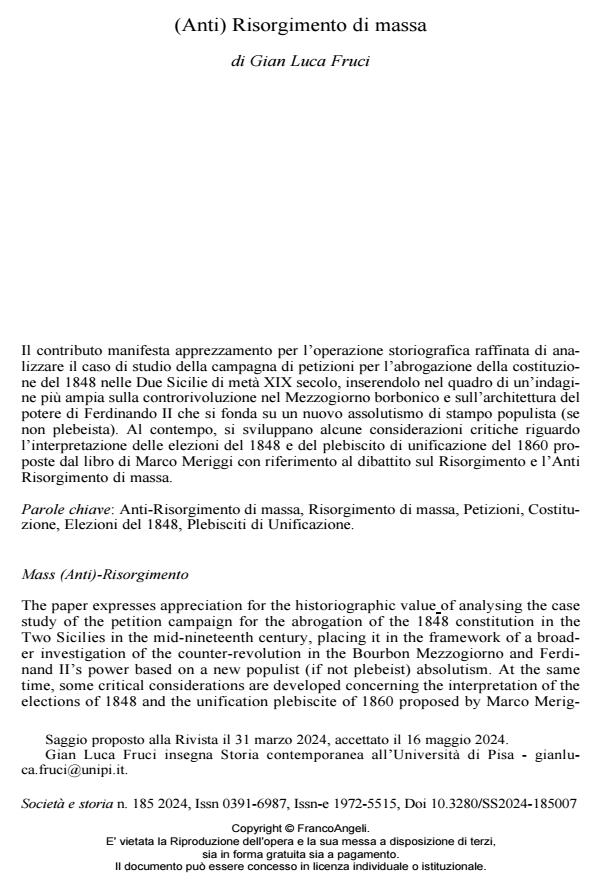(Anti) Risorgimento di massa / Politica di massa e controrivoluzione. Alcune note comparative. Da Napoli all’Europa / La monarchia populista
Titolo Rivista SOCIETÀ E STORIA
Autori/Curatori Gian Luca Fruci, Maurizio Isabella, Viviana Mellone
Anno di pubblicazione 2024 Fascicolo 2024/185
Lingua Italiano Numero pagine 26 P. 601-626 Dimensione file 159 KB
DOI 10.3280/SS2024-185007
Il DOI è il codice a barre della proprietà intellettuale: per saperne di più
clicca qui
Qui sotto puoi vedere in anteprima la prima pagina di questo articolo.
Se questo articolo ti interessa, lo puoi acquistare (e scaricare in formato pdf) seguendo le facili indicazioni per acquistare il download credit. Acquista Download Credits per scaricare questo Articolo in formato PDF

FrancoAngeli è membro della Publishers International Linking Association, Inc (PILA)associazione indipendente e non profit per facilitare (attraverso i servizi tecnologici implementati da CrossRef.org) l’accesso degli studiosi ai contenuti digitali nelle pubblicazioni professionali e scientifiche
Il contributo manifesta apprezzamento per l’operazione storiografica raffinata di analizzare il caso di studio della campagna di petizioni per l’abrogazione della costituzione del 1848 nelle Due Sicilie di metà XIX secolo, inserendolo nel quadro di un’indagine più ampia sulla controrivoluzione nel Mezzogiorno borbonico e sull’architettura del potere di Ferdinando II che si fonda su un nuovo assolutismo di stampo populista (se non plebeista). Al contempo, si sviluppano alcune considerazioni critiche riguardo l’interpretazione delle elezioni del 1848 e del plebiscito di unificazione del 1860 proposte dal libro di Marco Meriggi con riferimento al dibattito sul Risorgimento e l’Anti Risorgimento di massa.
L’intervento mette in relazione il lavoro di Marco Meriggi con le recenti revisioni storiografiche sulla natura del Risorgimento e sulla dimensione popolare dei movimenti controrivoluzionari europei. Inserisce il realismo popolare napoletano del 1848 nel più ampio quadro europeo, paragonandolo con fenomeni simili apparsi in Francia, Portogallo e Spagna negli stessi decenni. Infine richiama l’attenzione sulla flessibilità e la porosità degli schieramenti politici ottocenteschi.
L’intervento si sofferma su di un aspetto specifico della monarchia assoluta di Ferdinando II di Borbone così come emerge dal volume di Marco Meriggi: il suo definirsi, dopo la rivoluzione del 1848, sulla scia della volontà popolare. Vista da tale prospettiva, la ricerca di Meriggi sottrae il Mezzogiorno borbonico al paradigma dell’eccezionalità negativa e offre all’autrice la possibilità di confrontare il caso napoletano con le monarchie francese, britannica, russa e spagnola della prima metà del XIX secolo. La comparazione, intrecciata alla considerazione delle altre politiche del governo ferdinandeo esaminate in studi recenti, consente di comprendere la spinta di fondo nella ricerca del consenso popolare: creare una nazione napoletana moderna e – allo stesso tempo – orientata ideologicamente in senso reazionario che competesse con le moderne nazioni liberali.
Parole chiave:controrivoluzione, politica di massa, realismo popolare, Napoli, Spagna, Portogallo, Francia, Risorgimento, 1848, Anti-Risorgimento di massa, Risorgimento di massa, Petizioni, Costituzione, Elezioni del 1848, Plebisciti di Unificazione, monarchia, assolutismo post-rivoluzionario ottocentesco, Nazione napoletana.
Gian Luca Fruci, Maurizio Isabella, Viviana Mellone, (Anti) Risorgimento di massa / Politica di massa e controrivoluzione. Alcune note comparative. Da Napoli all’Europa / La monarchia populista in "SOCIETÀ E STORIA " 185/2024, pp 601-626, DOI: 10.3280/SS2024-185007